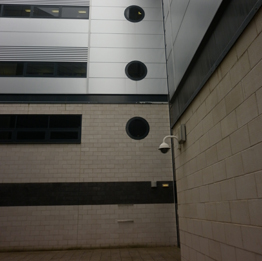Before the Boston Marathon bombing and the shooting of a MIT guard on April 19, security at US universities was aired at the annual conference of the UK university chiefs of security association AUCSO at the University of Durham, pictured.
**
Shootings in the United States were a topic for a speaker from overseas at the AUCSO conference in April. “I hope you never have to deal with it in the UK,” said Anne Glavin, president of the North American-based university security body IACLEA.
The campus law enforcement body IACLEA dates from the 1950s in the US, an era when a steam whistle might alert security guards to report to base to find out what they ought to do. Anne Glavin like others is a chief of police, now at California State University, Northridge; previously at Massachusetts institute of Technology (MIT). She made the point that public safety has become much complex than when she began as a rookie police officer at MIT. In those days, the number one crime was theft – of typewriters, for example, besides cars; and ‘LSD was the drug of choice on campus’. Who would have guessed, as she added, that the US would see terrorism, or shooting sprees on campus? Besides students protesting at the rising cost of fees, and student (and staff) ‘mental health issues’ which, as she described, can be behind shootings. As in the UK, US universities as open institutions were not only valued targets to terrorists but vulnerable (some also with chemical and other labs). What she termed the greatest challenge however was within; such as the killings at Virginia Tech, where 32 were killed and 17 injured before the shooter killed himself. In her opinion, gun violence in the US was ‘out of control’. How then to intervene at the right time, to stop a violent act? Because, she pointed out, people do not just snap, ‘they don’t just go crazy’; instead, there is what she termed a ‘continuum of violence’.
There are she suggested ‘red flags’, warning signs that the authorities can spot, and intervene with counselling. Virtually every campus in the US, she said, uses some sort of threat assessment. But often warning signs are missed and with that the opportunity for intervention. She gave a 2011 example of a student ‘spiralling down’; having trouble in his dorm, not getting along with two homosexual suite-mates. One weekend he shoved his mother. She, and staff, were getting concerned. The man was becoming more isolated, and not going out of his room. He was convinced to walk to the counselling service. There the man admitted wanting to harm or kill seven named people. Police came and assessed the student’s mental health (as they can in California). He was held. Meanwhile a search of the student’s room found a weapon and materials for a bomb. The man is now a mental health outpatient. While this case was treated as a ‘disaster averted’, those seven at-risk people – told by the university, as was their legal duty – are still monitored by campus police. “I don’t see this problem” Anne Glavin said – that is, of young people with mental health problems, arming themselves – “slowing down any time soon.” The university’s own police and local police are the first line of defence against any ‘active shooter’. She described one training exercise that included scared students who could only speak in sign language; officers had to work out that they would have to draw maps to tell the deaf and dumb students where to flee safely. She reflected that even on the aeroplane flying to the UK from the US, an English couple sitting next to her – who did not know her job – remarked about shootings on campus. “I said,” Anne Glavin told the conference, “certainly it is; it is something that bothers every American. I hope that you never have to deal with it to the extent we have to in the US. It is a very difficult thing and all of us on what I like to call the front line struggle over it.” IACLEA membership, she added is split over the US second amendment – that is, the right to bear arms. “However some of us, including myself, say a right should not be to the end of the earth.”










